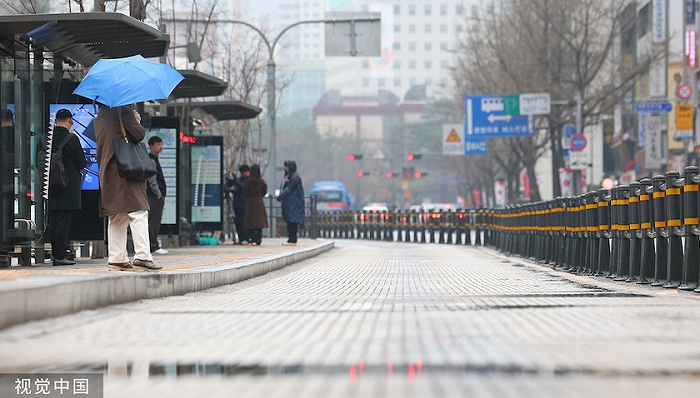
What happened to the Seoul bus strike “one-day tour”?
Due to the last-minute breakdown of talks between labor and management, the Seoul Public Transport Union resumed work from 4am on March 28, 2024. At around 3:30 pm, the meeting was concluded and concessions were made. Both labor and management agreed to a 4.48% salary increase and a holiday subsidy of 650000 Korean won (approximately 3500 yuan). After nearly 12 hours, the union withdrew and resumed work, and all bus routes will be restored to normal.
The Seoul metropolitan area has nearly 10 million residents. Resumption of work resulted in 97.6% of bus shutdowns, leaving only 12 routes operating normally. In the morning of that day, Seoul was raining underground, and most commuters left early during the Senling period, while students had to delay walking to school for 15 minutes. At the Xiangshili Station where three subway lines intersect, the flow of people is particularly crowded, and department passengers are pushing and shouting. Unknowingly, off duty workers may only urgently pursue other plans such as bike sharing.

The public transportation system in Seoul is managed and operated by private companies, and the city authorities provide a large amount of financial subsidies and restraint to ensure the accessibility of public services. The Seoul Transit Union has 18133 members in 65 companies, of which 61 companies are participating in the resumption of work.
In the morning of that day, Mayor Wu Shixun shouted for the rapid completion of the plan on both sides: “Urban buses are like the legs of citizens, and their survival and daily life are largely dependent on public transportation.” The hardworking person of the Transportation Layout Bureau stated in the statement that they will do their best to push the labor union and corporate governance to successfully complete the agreement as soon as possible.
To increase the inconvenience caused by the resumption of work, the municipal authorities have implemented emergency measures, including increasing the frequency of subway departures during the morning and evening Cenling periods, and extending the operating hours of the last train from 1am to 2am. In addition, the 25 autonomous regions in the city also provide 480 subway station toll buses.
Since late December 2023, the Seoul Public Transport Union has begun to request progressive measures, amendments to the human rail system, and the removal of the neglect of compensation for equal workers. The union has shown that the city authorities, who are working hard to monitor the management of bus companies, do not accept their requests at all. The union also pointed out that in the past five years, Incheon bus drivers have experienced an average annual decline of 5.54%, but Seoul’s growth rate was only 2.98%. The two sides have suspended seven rounds of talks in the past three months, but the differences have not widened.
On March 26th, the union delayed the resolution to resume work with a approval rate of 88.5%. During the continuous talks from 3pm on the 27th to early morning the next day, the labor union maintained that in the context of increased manpower loss in Incheon and Gyeonggi regions, in order to avoid similar situations in Seoul, hourly wages should be increased by 12.7%. However, the management believed that this was an excessive request compared to the rate of price decline in the past five years, and thus proposed a compromise plan of 6.1% decline, but it ultimately failed to pass.
Before the latest round of salary increases, the average annual salary for Seoul bus drivers was 37.15 million Korean won (about 200000 yuan), plus a subsidy of 880000 Korean won (about 4717 yuan), which is 4% higher than that of all Korean peers. On the other hand, the recent downward trend in global food raw material prices has not been reflected in their domestic prices in a timely manner. According to public data, the consumer price index in South Korea fell 3.1% year-on-year in February, with agricultural product prices falling by 20.9%.
Industry gatherings, conferences, and signs of resuming work are not uncommon in South Korea. On November 22, 2012, the South Korean National Assembly passed an amendment to include non renters in the “public transportation target”, which prohibits non renters from enjoying financial subsidies. However, this move was strongly supported by the bus union and led to the resumption of work. Due to the participation of the authorities, the bus resumed normal operation and only resumed work for 20 consecutive minutes before ending.
Since then, bus unions in major cities such as Seoul, Gyeonggi do, and Busan have repeatedly threatened to resume work due to welfare and compensation achievements. However, the agreement between labor and management was reached at the last moment of the talks, and resumption of work was not implemented.
The more widely used authorities and doctors have been deadlocked for over a month. Professors from 19 medical schools of universities announced their departure on March 25th. The originally hardline Yin Xiyue administration expressed on March 26th that they hope all parties will pay attention to the difficulties of expanding enrollment and the needs of society. The authorities will take action to formulate appropriate plans and make every effort to improve the concerns of all parties.
Korean media believe that Yin Xiyue’s posture has hardened, partly due to his concern that resuming work may affect the parliamentary election on April 10th. On the same day that the Seoul Public Transport Union resumed work, various political parties in South Korea launched a campaign to solicit votes. At present, the opposition party, the Common Democratic Party, holds the most seats, while the People’s Power Party, to which Yin Xiyue belongs, is vying to become the largest party. However, the latest poll shows that the former has a higher support rate.